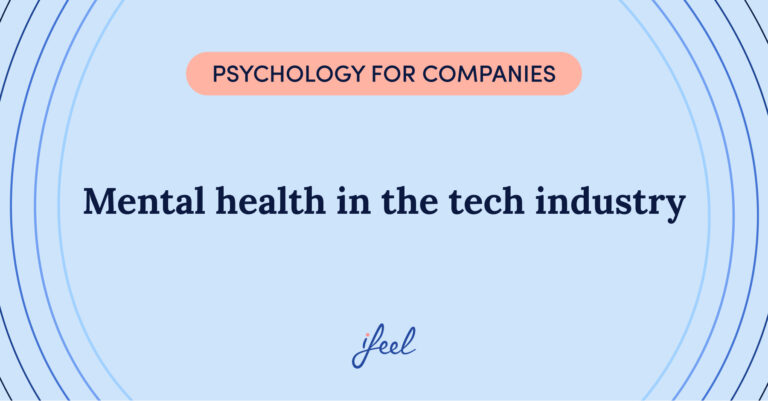In today’s business environment, AI training for employees has become a strategic priority for organisations looking not only to remain competitive and efficient, but also to innovate in a constantly evolving marketplace.
Today, the ability to integrate artificial intelligence tools into work processes not only optimises productivity by automating repetitive tasks but also frees up time for employees to focus on higher-value-added activities such as creativity and complex problem-solving.
In addition, AI offers the ability to personalise experiences and improve data-driven decision-making, driving more sustained and adaptive growth. For this reason, training employees in AI is critical to organisational success in modern businesses.
To this end, ifeel has developed a free downloadable HR AI implementation strategy that will not only help you evaluate your processes, but will guide you step-by-step in adapting AI to your organisation.
Relevance of AI in the work environment
Artificial intelligence (AI) is a technology that has transformed multiple industries by automating routine tasks and providing advanced data analytics. In HR, for example, AI can automate administrative processes, optimise talent management, and improve new employee onboarding. This ability of AI to improve efficiency and accuracy in internal processes is a key factor driving organisations to adopt it more broadly.
In fact, a study by Deloitte shows that 94% of business leaders surveyed consider artificial intelligence critical to their organisations’ future success. This recognition highlights the crucial role AI plays in cost reduction and operational improvement, innovation, and the generation of new market opportunities.
This trend highlights the importance of continuous and adaptive training, as training employees in AI not only improves operational efficiency but also optimises decision-making and customer experience.
Benefits of AI training for businesses
Investing in employee AI training offers multiple benefits for businesses. It enables them to better adapt to today’s dynamic technology environment while supporting the career development of their employees.
This investment boosts operational efficiency and improves the organisation’s capacity for innovation and competitiveness. Here, we explain more about the benefits of investing in AI training for employees.
| Benefit | Description |
|---|---|
| Improved productivity | Training employees in AI enables them to use advanced tools that automate repetitive tasks, freeing up time for strategic activities. This leads to a significant improvement in overall productivity. |
| Innovation and adaptability | With AI knowledge, employees are better equipped to innovate and develop new solutions that transform products and services, keeping companies at the forefront in a competitive and ever-changing market. |
| Data-driven decision making | The ability to handle large volumes of data through AI allows employees to make more informed and accurate decisions, helping to identify business opportunities and mitigate risks more effectively. |
| Increased engagement and talent retention | Offering AI training demonstrates the company’s commitment to professional development. It enhances engagement and talent retention by providing clear pathways for growth and advancement within the organisation. |
| Return on investment in human capital | Training current employees in AI is more cost-effective than hiring new personnel. Internal training leverages existing knowledge about the company’s culture and processes, avoiding costs associated with recruitment and onboarding. |
In short, training employees in AI provides companies with a crucial competitive advantage. By training their staff in these emerging technologies, organisations not only optimise their operations, but also foster an environment that encourages innovation and continuous growth.
AI training of employees: effective strategies
To ensure the successful implementation of AI, training methods that enable employees to adapt to these new tools must be considered.
To assist in this process, ifeel has developed a free downloadable HR AI implementation strategy that will not only help you evaluate your processes, but will guide you step-by-step in adapting AI to your organisation.
Here are some of the most effective strategies:
1. Initial needs assessment
Before implementing any training programme, it is crucial to assess the specific needs of the organisation and employees. This includes identifying which processes can benefit from AI and which skills need to be developed.
2. Customised training
Personalisation of learning is key. Machine learning technologies should tailor content to individual needs and skills to do this. This can significantly improve the effectiveness of training. Personalised training plans allow employees to learn at their own pace and focus on the areas that will benefit them most.

3. Hands-on learning
Incorporating hands-on exercises and simulations is essential for a thorough understanding of how to use AI tools. An environment where employees can experiment and make mistakes without risk encourages more effective and lasting learning.
4. Regular updates
AI training should not be a one-off event but a continuous process. Technologies evolve rapidly, and employees need to be kept up to date.
For this reason, organising regular refresher sessions, which can include workshops, seminars, and online courses, ensures that employees are kept up to date with the latest innovations and best practices in AI.
5. Encourage collaboration
Creating a collaborative learning culture where employees can share knowledge and experiences is crucial. This not only strengthens individual learning but also fosters collective innovation.
6. Use of digital platforms
Leveraging digital learning platforms can facilitate access to educational content and enable tracking of employee progress. These platforms can also provide analytics to further personalise the learning experience.
Impact of good training on the business
Implementing an effective employee AI training programme not only improves operational efficiency, but also has a positive impact on organisational culture. As employees feel more empowered and confident in their technology skills, their engagement and job satisfaction increases.
Pilar Collado Puerta, Head of Talent Management and Laura Risquete Trigo, HR – Talent Development at González Byass, an ifeel partner company, say:
‘To remain competitive, our value proposition must put the employee at the centre, taking care of their well-being and offering development opportunities’.
This highlights the importance of training that focuses on technical skills as well as the integral development of the employee.

Trust the experts
At ifeel, we know that AI training for employees is essential for any organisation looking to make the most of the opportunities offered by emerging technologies. In the end, this training investment not only unlocks every employee’s potential, but lays the foundation for long-term, sustainable success.
To support companies in this process, our team of expert workplace well-being psychologists has created a mental well-being solution for businesses that improves talent retention, reduces presenteeism, and combats employee stress.
With our mental well-being solution, your company’s HR managers can receive personalised, data-driven advice on improving mental health at work. In addition, this solution offers employees a 360° mental well-being service structured at different levels according to their needs. Try our solution now to see how it could help you.
We hope you found this article about AI training for employees interesting. If you would like more information about our mental well-being solution for companies, simply request it, and we will contact your team as soon as possible.











